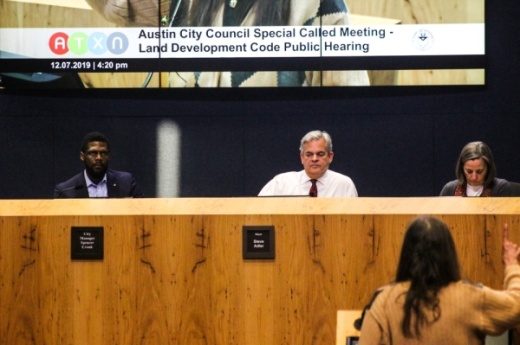Amid the hours of at times heated debate over specific aspects of the code on Feb. 12, some council members claimed they were being accused and treated unfairly, others remained tight-lipped throughout, the mayor linked one argument to climate change denial and there was talk of a “settlement” on the dais that could overhaul the overhaul in the name of consensus.
Austin has been working to rewrite its land code, the rules governing what can be built in the city and where since 2012. In August 2018, City Council had chosen to kill the existing 5-year effort due to the growing division amongst Austinites over the code’s direction. The effort rebooted in February 2019, but much of the division remains.
City Council is aiming to take its second of three votes on the land code by Feb. 13, with a plan of final approval in late March or early April. When council began deliberation on the second vote on Feb. 11, they were tasked with working through 80 changes brought forward by individual council members, ranging among topics such as minimum lot sizes, the intensity of housing in certain areas of town and parking requirements. Through two days they took care of 38 amendments, with the debate reaching a fever pitch several times.
Of the 25 votes City Council took on changes through Feb. 12—some of the amendments were postponed or withdrawn—nine passed unanimously. The remaining 16 proposed changes—nine passed, seven failed—were the products of a split dais. Of the 16 split votes, 11 found Council Members Kathie Tovo, Leslie Pool, Alison Alter and Ann Kitchen together as the minority voting bloc.
For much of the Feb. 12 meeting—City Council only debated for an hour on Feb. 11—it was the bloc of Alter, Tovo, Kitchen and Pool asking most of the questions and challenging staff and their colleagues to provide explanations for proposed changes. Other council members were notably terse in their responses, sometimes even passing on requests to further explain their perspective.
At one point, Tovo questioned staff on why they were proposing increased housing density along a central section of North Lamar Boulevard, an area of town long designated for such density. At another, Tovo asked Council Member Jimmy Flannigan to explain a change he proposed for reducing mandated building setbacks for some zones—a request he rejected, simply telling Tovo if she didn’t like the change she could just vote against it.
The growing tension reached a boiling point when Tovo proposed an amendment that would restrict properties in documented localized flooding areas from transition zone entitlements. Transition zones are zoning categories that allow moderate housing density, and typically fall between the less dense neighborhood interiors where single-family homes are located and the highly dense transportation corridors where one would find high-rises.
Mayor Steve Adler said he would not support the change, because he felt it linked greater housing density to increased flood risk when city staff and the city’s watershed experts have regularly said there is no link. Adler called it “unfortunate” that neighborhood residents are being made to believe by some in the community that there is a link. He then said the refusal to accept the science and explanation laid out by the city’s experts reminded him of climate change denial. Tovo took immediate issue, and told Adler the issue was “not as clear cut” as he described.
The tense exchange continued as Tovo brought forward an amendment to reduce the size of transition zones throughout the city, a topic that has remained a focal point throughout the multi-year process. Adler asked Tovo and Alter, who had a similar amendment later in the evening, if they would vote for the land development code as a whole if the transition zone reduction change was made. Adler said he would consider supporting the move if it meant reaching a broader consensus on the project.
Alter said for her and her constituents in West Austin, a way forward would have to include reducing transition zones. She said trust in elected officials and city staff among her constituents has eroded. She called the tenor of the day’s debate “indefensible” and said the way some of the council members were being treated was “inappropriate.”
Adler said everyone is responsible for eroded trust, emphasizing the difficulty of this process on each council member and their constituents. He said his question regarding transition zones still stood and called it “the settlement” and “the compromise” to get this land development code passed. Tovo said she would think about it.
Mayor Pro Tem Delia Garza interjected toward the end and said the point of the land code rewrite process was to get more housing. She said the amount of housing the code could yield was the essential element of the code, not the size of transition zones. Staff said they would run an analysis on how much housing could be produced if Adler’s transition zone reduction deal was a reality.





